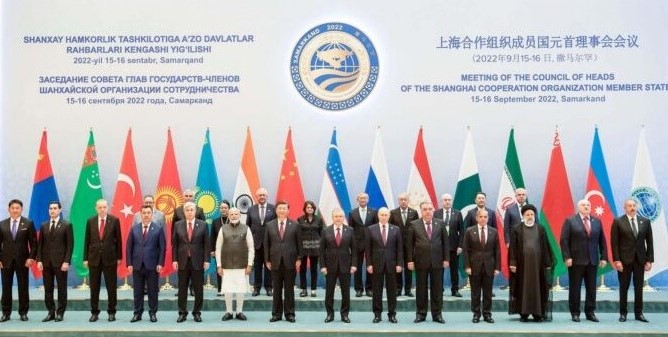Formed in 2001 by China, Russia and the former four Soviet republics of Kazakhstan, Kyrgyzstan, Uzbekistan, and Tajikistan, the Shanghai Cooperation Organization (SCO) was a diplomatic and organizational setup to combine the collective bargaining power of this region in world politics. This Organization was initially focused on the security and regional stability of this region.
SCO members
India and Pakistan joined SCO in 2017 while Iran joined it this year. Afghanistan, Mongolia, and Belarus are observer states. Nepal, Si Lanka, Turkey, Armenia, Azerbaijan and Cambodia are the dialogue partners of SCO.
These six sovereign states are not proper members of the Shanghai Cooperation Organization (SCO) but they partake in the discussion of the Organization as having special interests as well as positive contributors to its cause.
Also Read: Biosecurity Sovereignty: Modern epidemic solutions
With 40 per cent of the world population having a 30 per cent GDP, SCO could be a tough challenger to the West and the US provided that it resolves its internal differences to emerge as a potent force to them.
Crisscross motives
Two founding members of SCO, China and Russia have a long history of ups and downs with Washington and the West that make them suspicious about any move of them.
Likewise, the other members of the organization for example, India are eager to see a multipolar world order having ample space for it. It wants to tackle all three powers, Beijing, Moscow, and Washington for it.
China though a competitor of Washington shares ill feelings with Moscow about the West and the US does not appreciate the Russian move to make SCO an anti-west and anti-US alliance focusing only on military and security aspects of the region like that of NATO. The main framework of SCO resembles more to ASEAN and ECO.
Rather Beijing want to develop this Organization into a strategic and political asset by getting a domineering leverage for it to downplay the pressure of the West and its allies.
US campers in SCO
To broaden its sphere of influence and engagement, Beijing has included some diehard campers of the US in the Organization. Saudi Arabia and the United Arab Emirates (UAE) joined SCO in April 2023 as dialogue partners.
This move is in close line with their recent move to diversify their foreign policies and to cultivate bilateral and multilateral relations with other non-western countries as well.
Beijing has tactfully changed the agenda of the Organization over time concentrating more on economic development than other things. This diversification right from economic planning and expansion to cultural cooperation and interaction creates new avenues for more positive engagements in all spheres other than the West and the US.
An integrated future
This holistic approach may pay a positive outcome to SCO making it a regional group or organization that looks into every facet of national and regional interests apart from mere military and security aspects.
Though a successor organization of the Shanghai Five (1996), it was initially formed only to focus on the Mutual Military Trust among the regional countries.
But with Beijing’s cautious move, it is now turning to a more comprehensive strategy than that of only security.
One common point the majority of these new joiners share with China and Russia is their repugnance to the behavior of the US and its allies.
Also Read: Thousands marched over ‘enforced disappearances’ in Bangladesh
They are of the view that are stunted and forced to toe the line of their Washington and Western masters despite they did not want to do so or even they have a domestic public revulsion for it.
President Xi Jinping called on the member states in the 23rd meeting of the SCO’s Council of Heads of State to resist the unilateral imposition of sanctions.
India’s Chabahar port in Iran suffered and still suffers from these sanctions on Tehran by the US and the West.
The soft balancing power of SCO could be realized only if the regional countries are intertwined with each other in trade and economic spheres.
It was reported in the media that New Delhi refused to sign the SCO’s Economic Development Strategy as it contained too many references to the Beijing Global Development Initiative (GDI). Though this Chinese GDI is in close line with UN Agenda 2030, India does not want to openly jump over the fence to the other side!
Such internal issues may surely hinder the work, growth and development of this Organization. Which in future may serve as a soft, counterbalancing and strategic leverage to the developing countries of the world.

